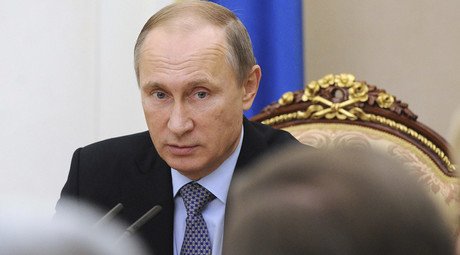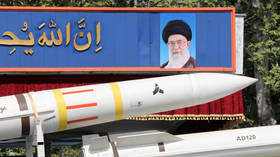'Plan for bridging Syrian divide handed to Russian diplomat in Paris three weeks ago' - US General
Three days after I left Paris, Putin called Assad to Moscow, the first such trip by Assad in 5 years, revealed retired US Army General Paul E. Vallely, who added he’s been in contact with opposition rebels who are showing a willingness to negotiate.
Moscow has hosted talks with Syrian opposition officials who are pushing for a peaceful resolution to the war. Russia says it is ready to sit down with Western-backed rebel groups.
RT: From your contacts with Western-back opposition just how willing are they to engage in talks with Russia?
Paul E. Vallely: I was in Vienna, Austria and Paris, France three weeks ago and I had an opportunity to see the transit of the refugees coming from Lesbos, up through Serbia to Hungary to Austria, then of course up into France and Germany.
I also had an opportunity to present my 6-point plan to the Russian Federation Ambassador [Mikhail] Bogdanov in Paris and I recommended at that time that he relayed to President Putin there are the senior members of the opposition forces, which is the Free Syrian Army, which is composed of former ministers, generals, doctors, professors that would be very amenable to meeting with the Russian delegation in order to solve two things: 1. The reunification of Syria, and 2. Solving the European-Syrian refugee problem.
RT: Of those looking at this conflict, Western countries have so far refused to engage in talks with President Assad. Russia has said it is ready to meet with all the warring sides in the Syrian conflict. What do you make of the way Russia has approached this? How helpful are the countries efforts in resolving the problems in Syria?
PEV: I think they are very positive right now. I am very encouraged by the 6-point plan that I presented to Ambassador Bogdanov [Special envoy to the Middle East, Deputy Foreign Minister Mikhail Bogdanov] in Paris, who I met along with his deputy. Three days after I left Paris, by the way, Putin called Assad to Moscow. Now that’s the first time in 5 years. And then three or four days later – in the first meeting in Vienna and the subsequent meeting being scheduled now – so I think my 6-point plan presented to the Russians is being taken very well and it seems to be a positive movement. So I hope we can have an impact on solving those two situations, but I made it very clear that nothing’s going to happen positively in Syria until Assad is removed and a new interim government is put in.
RT: Now, the Free Syrian Army, it’s not just one entity – it’s made up of various fighting groups...
PEV: No, that’s not true. The Free Syrian Army – they’re the only fighting group there is and they were the initial ones that broke off, headed up by Colonel Riad [al-Asaad] and about 15 general officers as well as ministers that had left in order to oppose Assad and his tyrannical rule.
RT: So they think with one mind and they would all be willing to sit down to the table and negotiate with Russia, in your opinion?
PEV: That’s correct, and I also provided the Russians with the names of those individuals and more individuals if they would like them, and I said “the meeting can be conducted in Paris, Moscow or Vienna’ and I would provide the names of the reputable, credible Syrian opposition leaders.”
RT: The all sounds very hopeful, but the US State Department, though, hasn’t sounded as positive. It’s actually refused to comment on Russia’s intention to engage in negotiations with the Free Syrian Army.
PEV: Well, it’s hard to tell exactly where [the Americans] are coming from. I was inside Syria in 2013 and vetted the different groups out and I brought that information back to our government. So to say it’s “premature” – we’ve had an opportunity in the United States to do something about this for almost three years now and nothing has moved forward. So to say it’s “premature” is completely naïve and not credible in my opinion.
RT: Ultimately, do you think we could see the Syrian government and the Free Syria Army working together to fight Islamic State?
PEV: Yes, I do. And that’s why it’s going to take the Free Syrian Army to merge with the existing Syrian Armed Forces under new leadership in order to reunify Syria, and also to create a safe haven so the refugees can come back from Europe and are simultaneously conducting air-ground operations against the ISIS forces in the eastern part of Syria.
So this is a well-formulated plan that I’ve given them and I think it’s workable and I think we’ll head that way. But the key thing is: Assad has got to go… but he has got to leave and there’s got to be a new government that represents all Syria for what I call the “New Syria” and the reunification of Syria.
The statements, views and opinions expressed in this column are solely those of the author and do not necessarily represent those of RT.













